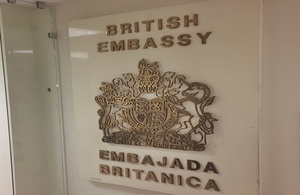Madam President, today, almost everything has a digital dimension.
The international community needs to grasp the tremendous opportunities that the internet offers, for learning, for business, for communication and, indeed, for entertainment.
But we also need to treat the threats that go with that, with the seriousness they deserve.
The threats posed by malicious and dangerous activity in cyberspace are now clearer than ever.
Indeed, only last month, a criminal gang targeted Colonial Pipeline, holding to ransom America’s largest fuel pipeline and threatening serious economic disruption.
Some of this activity aims for theft or extortion. Often, it is simply sabotage and disruption.
But we have a collective responsibility, as an international community, to create a cyberspace that benefits all countries and, indeed, all people. Together, we should be shaping the rules that serve the common good.
We are of course not starting from scratch in this regard.
It was ten years ago that the UK brought together more than 60 countries in London, to establish basic principles like universal access to the internet, and protecting individuals’ rights online.
Ten years later, we have come a long way since then.
Just this year, the UN General Assembly unanimously reaffirmed the application of international law in cyberspace and agreed a set of voluntary principles, including the importance of protecting health infrastructure.
A Group of Governmental Experts moved forward our understanding of the norms, rules and principles of cyberspace, and set out clear interpretations of how international law applies.
But we want to go further. It is no secret that states are developing cyber operations to support their military and national security capabilities. Indeed, the United Kingdom is one of them.
Let me be clear: we will use these capabilities to defend ourselves against those who seek to harm us. We are committed to use these capabilities where necessary, in a proportionate way, and in line with international law.
Our collective challenge here is to clarify how the rules of international law apply to state activities in cyberspace, guard against malicious actors bending the rules, and enforce the consequences for those who commit malicious cyber activity.
The United Kingdom is committed to working with all countries, and with its many stakeholders, to make sure cyberspace is governed by rules and norms that enhance our collective security.
Rules and norms that promote democratic values, rules and norms that support global economic growth, and counter the spread of digital authoritarianism.
We must uphold the rule of law in cyberspace: embodying responsible state behaviour, incentivising compliance, deterring attacks and, indeed, holding others to account for irresponsible state behaviour.
We must also absolutely prioritise and ensure human rights are protected online, as they are offline, to ensure we build a free, open, peaceful and secure cyberspace, accessible to everyone.
The UN framework for responsible state behaviour in cyberspace is our starting point. We must support all States to now implement it.
The United Kingdom was pleased to announce last month that we will invest over $30m to support cyber capacity-building in vulnerable countries – particularly across Africa and the Indo-Pacific.
Our work with Interpol will help countries, including Ethiopia, Ghana, Nigeria, Rwanda, and Kenya, support joint operations against cybercriminals.
Elsewhere, UK funding will help build national emergency response teams to protect countries against these threats.
We could of course do none of this without our partners in the private sector, and, of course, in academic and civil society.
But, in all of this, as we join here together today, the Security Council also has a pivotal and an important role to play.
Where malicious activity poses risks to international peace and security – by exacerbating conflict or causing humanitarian suffering – the Security Council must be ready to respond.
The Council should respond just as it would to threats posed by conventional means.
Madam President, we have the chance to grasp the opportunities of cyberspace and ensure it remains a force for prosperity and progress for all.
To do that, it is vital that we work together to counter those who would risk our collective security.
And let me assure you of this: the United Kingdom is fully committed to protecting a free, open, peaceful and secure cyberspace for generations to come.

